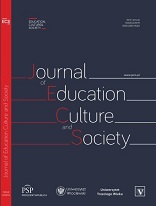Between resistance and collaboration: A teacher's professional activity in the Third Space
Between resistance and collaboration: A teacher's professional activity in the Third Space
Author(s): Jūratė LitvinaitėSubject(s): Social Sciences, Education, Pedagogy
Published by: Fundacja Pro Scientia Publica
Keywords: Teacher's habitus;pedagogic work;pedagogic authority;cultural capital;reproduction of culture;subaltern;encounter;Third Space;mimicry;hybrid culture
Summary/Abstract: The article proposes to examine teachers' professional activity with the help of P. Bourdieu's theory of sociology of education and the theory of postcolonialism. According to P. Bourdieu's theory, it is revealed how the teachers' habitus, acting under the pressure of external structures, reproduces a culture that ensures the continuity of the position of dominant classes. In this respect, the teacher is similar to a colonizer sent to civilize by barbarian tribes. From a postcolonial perspective, the processes of cultural imposition are disrupted as cultural resistance in the "barbarian" tribes intensifies. Rejecting the one-way cultural movement (from colonist to colonized), postcolonialism speaks of encounters in which both sides undergo cultural change. A Third Space is formed, in which a hybrid culture is created. In this sense, the teacher can no longer be seen as the conqueror of new generations. He/ she is a social agent looking for his/ her own strategies and ways of survival. Taking over Other's culture is the teacher's resistance in professional terms and collaborating with the Other's culture. Resistance and collaboration interrupt reproduction and expand the hybrid culture. It is a state of uncertainty and tension that leads to dissatisfaction with professional activities. This interpretation seeks to explain the decline in the prestige of the teaching profession and teachers' own dissatisfaction with their work, as recorded in OECD TALIS 2018 research. Concept. P. Bourdieu states that the purpose of a school is to reproduce power relations. Teachers, using their authority, implement a culture that supports the position of the dominant class. However, various new studies show a decline in teachers' authority. The rupture of hierarchical connections in the process of culture imposition is being studied in postcolonialism. By applying the ideas of H. K. Bhabha, the modern teacher activity can be explained not as a cultural reproduction but as a teacher's constant encounters with the culture of the Other. A space where cultural encounters take place, K. H. Bhabha names the Third Space. Here a new hybrid culture emerges, and a school becomes open to otherness and diversity.
Journal: The Journal of Education, Culture, and Society
- Issue Year: 13/2022
- Issue No: 1
- Page Range: 157-171
- Page Count: 14
- Language: English

